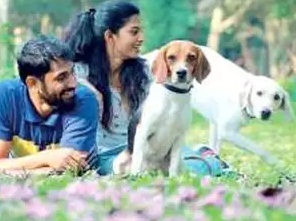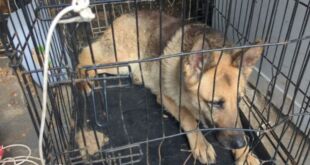When Deepti James got Cleopatra home in July last year, the seven-year-old beagle settled into a nook of her Mahadevapura apartment and did not move for about three weeks. Cleo, rescued from a pharmaceutical laboratory, had been subjected to traumatic drug tests.
“She had scars on her back and her ribs, and both she and her pups had been used for breeding. Cleo did not know how to adapt to the world — everything, from the stairs to the sky, was new to her. She was flustered by visitors, and the and the slightest sound,” said James. James and her husband were shortlisted after a stringent adoption process and undertook pre-adoption counselling session.
Their home had to be prepared for the dogs: meshes on the grills, customised toys, name tags and Martingale collars.
James said, “When we tried to take her out for walks, Cleo would just sit down and we’d have to pick her up and walk.”
Two years ago, Bengaluru witnessed the largest lab release of beagles in the world when 156 ‘freagles’ (free beagles) were rehabilitated by Compassion Unlimited Plus Action (Cupa). Since then, Freagles of India, a non-profit formed by Cupa volunteers, has re-homed over 125 beagles across India. They have recently rescued a batch of 13 beagles from a Hyderabad lab, which will be up for adoption soon.
Beagles are used for clinical testing in pharmaceutical and pesticide industries.
According to a paper titled Use of Animals in Scientific Research, published by the Indian Council of Medical Research in 2000, “Toxicological studies, especially those performed on rodents and beagle dogs are the essential link between the pre-clinical phase and clinical development of the drug molecule.”
In 2015, the Committee for the Purpose of Control and Supervision of Experiments on Animals (CPCSEA) mandated.
According to Chinthana Gopinath, founder trustee, Freagles of India, Bengaluru leads when it comes to people opening up their homes to lab-tested beagles, followed by Pune and Ahmedabad. The reasons, she says, is the example set by a few families and increased awareness.
“Majority of the families opting to adopt are first-timers, which is good, since they do not have pre-set notions and are willing to learn,” said Gopinath. “Counselling is also critically focused on setting the right expectation.
According to strategy consultant Rashmi Gowda, a first-time adopter, online platforms like Beagle Brigade, with over 8,800 members who have adopted lab-rescued beagles, offers a strong support network.
“Rescued beagles need a lot of mental stimulation, physical exercises and specialized care. All it takes is patience and understanding.”
Reference: The Economic Times
Want to read more articles like these? Subscribe to our newsletter today!

 DogExpress
DogExpress


















 in Chandigarh, India.
in Chandigarh, India. 
